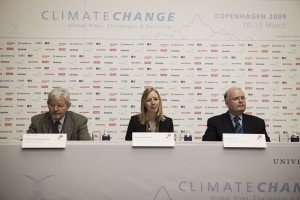The International Scientific Congress on Climate Change in Copenhagen wrapped up last week with a series of key messages it will pass on to politicians meeting later this year to try to decide the fate of a coordinated international response to global warming, at the UN’s upcoming COP15.

On the subject of climatic trends, the key message is:
“Recent observations confirm that, given high rates of observed emissions, the worst-case IPCC scenario trajectories (or even worse) are being realised. For many key parameters, the climate system is already moving beyond the patterns of natural variability within which our society and economy have developed and thrived. These parameters include global mean surface temperature, sea-level rise, ocean and ice sheet dynamics, ocean acidification, and extreme climatic events. There is a significant risk that many of the trends will accelerate, leading to an increasing risk of abrupt or irreversible climatic shifts.”
Read the full scientists’ statement.
Dr Andy Reisinger, Senior Research Fellow at Victoria University of Wellington’s Climate Change Research Institute, attended the congress and sent us the following statement.
“The international climate change congress in Copenhagen concluded with a strong message that inaction on climate change is inexcusable. The congress gathered about 2000 researchers in the field of climate change to discuss scientific findings that have emerged over the past two years since the publication of the Intergovernmental Panel on Climate Change (IPCC) Fourth Assessment Report.
“The congress heard from Lord Nicholas Stern, Professor at the London School of Economics and author of the 2006 “Stern Review on the Economics of Climate Change”. He said that based on the most recent scientific findings, his report had probably underestimated the damages and risks from climate change. His 2006 review had found that the costs of stringent emission reductions would be significantly less than the costs of inaction and resulting climate change damages. He said that recent advances in science had made the economic case very clear, and that emission reductions of at least 80% below 1990 levels were required from industrialised countries by 2050 to adress the risks of climate change.
“Regarding the current economic crisis, Lord Stern said that it would be “confused analysis” to postpone action on climate change due to the recession. Investment in low-carbon technologies could provide additional employment and make use of reduced labour costs to invest in new infrastructure. Such green investment could address both climate change and provide an economic boost for sustained future growth. The alternative of pursuing a conventional high-carbon path would “kill itself” through the rising cost of fossil fuels and increasing climate change damages.”
News coverage in the days since the congress concluded has focused on the difficulties facing politicians ahead of the December meeting’s big push to devise a replacement for the Kyoto Protocol, due to expire in 2012.
In the News
Reuters: UN Climate Chief hustles on global warming deal
International Herald Tribune: UN warns EU to keep promise on climate change
Associated Press: Europe, US to work together on global warming
BBC: What message, and whose, from Copenhagen?
Scientific American: Connecting science and policy to combat climate change
AFP: Climate change blues: how scientists cope
Guardian: From science to statesmanship